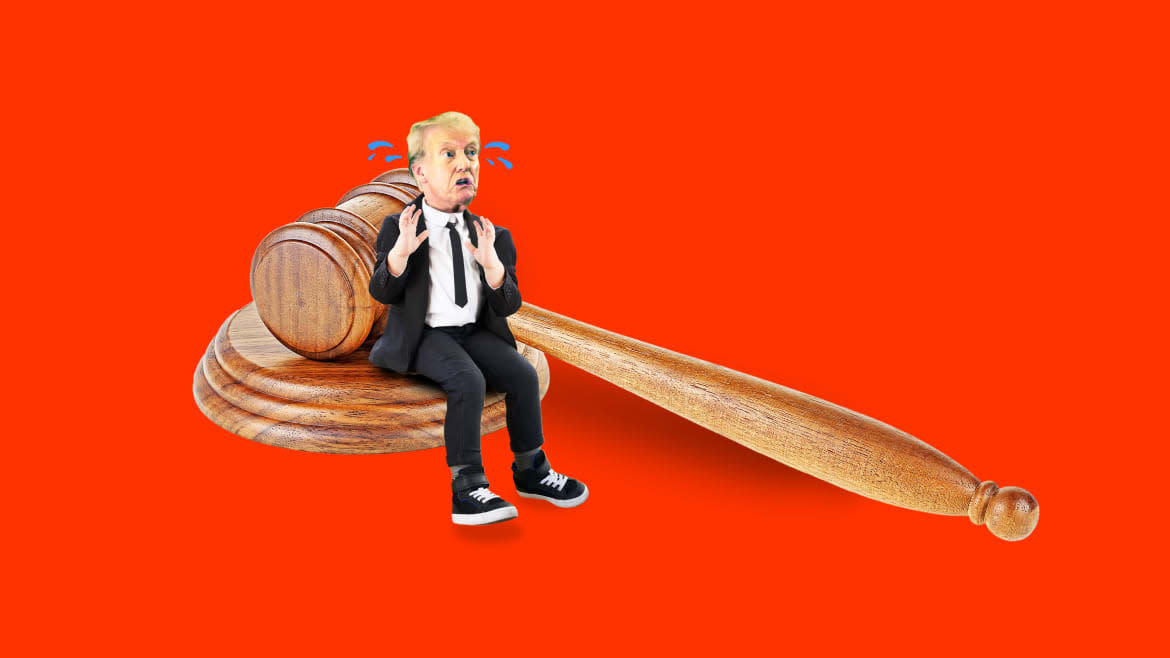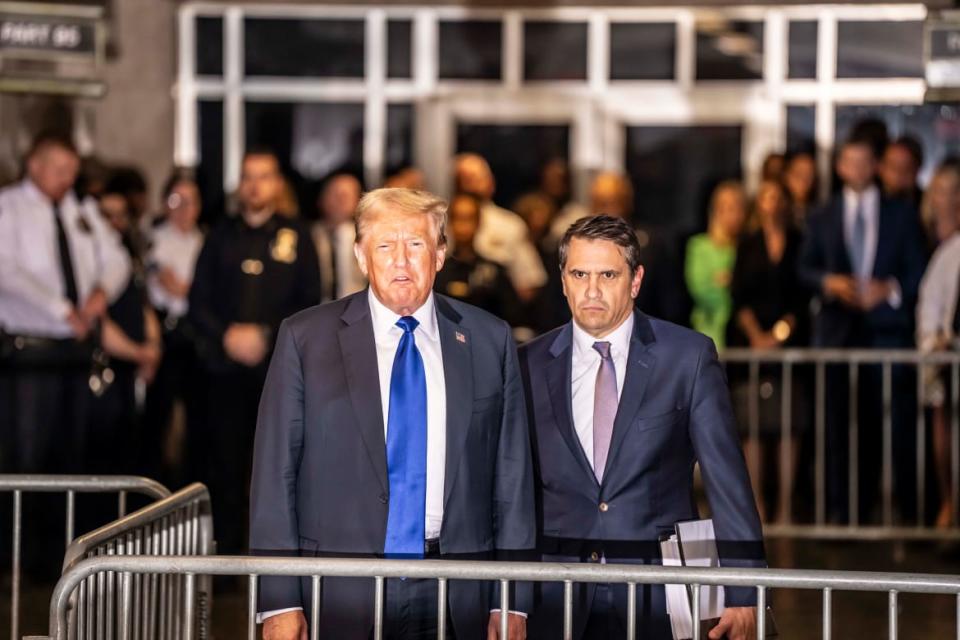Opinion: Trump’s Whining About a ‘Rigged’ Judiciary Is Ridiculous

Minutes after a jury of Donald Trump’s peers found him guilty on all 34 felony counts, the former president trotted out the same tired line about the system being rigged that he seems to air whenever he loses, whether it’s a court case, an election, or even at the Emmy Awards. For Trump and his allies, those complaints are generally reserved for judges and juries and voters when things don’t go his way. But that’s not how the law, or the rule of law, works.
What Trump really means when he says something is rigged is that he lost. However, there are several legal forums where he is doing just fine—and he doesn’t think those courts are rigged, or at least not rigged the wrong way. It’s not the “rigging” that’s the problem in his eyes. In fact, he likes them rigged in ways that help him.
In the months leading up to the 2020 election, then-President Trump expressed the sentiment that the Senate needed to move quickly to fill the Supreme Court seat that had become vacant after Justice Ruth Bader Ginsburg’s death.
Hunter Biden Prosecutors Might’ve Already Lost the Jury
Trump knew that the election was going to be close. He wanted to ensure he could pack the court with judges who he thought would rule in his favor should the contest find its way to the courts, and, ultimately, the Supreme Court.
The plan to have the Supreme Court decide the election in his favor failed miserably. His lawyers filed dozens of baseless and unsuccessful lawsuits to challenge the results. And some cooked up schemes to develop fake slates of electors to send to Congress on Jan. 6 in an effort to stall the certification of then-President-elect Joe Biden’s victory.
Many of the lawyers who filed these lawsuits and developed the fake electors’ scheme have either been suspended, pleaded guilty to various crimes, and/or now face disbarment for their actions.
When the smoke cleared on all of these bogus legal actions, Trump was asked whether he needed better lawyers. His answer, no, he needed “better judges.”
And what is a “better judge” in Donald Trump’s mind? Well, that’s quite simple: It’s a judge who rules in his favor.

Donald Trump and his attorney Todd Blanche exit the courthouse and speak to media after Trump was found guilty following his hush money trial at Manhattan Criminal Court.
Justice Juan Merchan, who presided over the trial in which a New York jury found the former president guilty on 34 felony counts, is not one of those judges. He was “conflicted,” in Trump’s words, and “the devil”—even though, during the course of the trial, he made several evidentiary rulings that seemed to favor the defendant, and generally handled a very challenging case with great equanimity and poise in the face of vicious and personal attacks on him and his family.
Is there an example of a judge who Trump likes? Why, yes. U.S. District Judge Aileen Cannon is certainly the type of judge Trump prefers.
Cannon, who is presiding over the classified documents case brought by Special Counsel Jack Smith, has stymied the progression of that case by entertaining, delaying her consideration of, and even pushing back hearings on, numerous evidentiary motions and borderline frivolous legal claims that most judges would dispose of as a matter of course.
Justice Alito’s Jan. 6 Flags Are a Desperate Wake-Up Call for the DOJ
In that case, though, Trump has essentially bragged about having committed the offenses for which he is charged—and has argued that everything he did was totally legal. It is difficult to fathom how the matter has dragged out for so long.
But what is important for the defendant in this case is not victory, but simple delay. Kick it down the road, and make sure the trial does not occur before Election Day 2024. After that, all bets are off.
And if Trump is elected once again, he can simply pardon himself, or rely on the Justice Department’s policy of not prosecuting a sitting president. (Judge Cannon appears to be doing just about everything she can to accommodate that goal.)
In a case involving the fake electors’ scheme, the criminal case brought by D.A. Fani Willis in Georgia, an appeals court in that state has agreed to hear an appeal of the trial court’s decision to reject the effort to disqualify Willis for her romantic relationship with her chief prosecutor in the case. While the trial judge chastised Willis for a lapse in judgment, he did not find her conduct warranted disqualification. There, delay also serves the former president, and that is exactly what these procedural maneuvers will produce, with the appellate court setting down oral argument for October, staying all proceedings below.
But not all cases move at a snail’s pace.
At the U.S. Supreme Court, the body jumped into action when Colorado sought to keep the former president off the ballot in that state for his alleged participation in the events of Jan. 6 under the Insurrection Clause of the 14th Amendment to the Constitution. There, the court heard oral arguments just weeks after the case came before it, and a decision followed less than a month after that. And there was no “rigging” there, apparently: Trump won, with the court’s justices who were nominated by Democratic presidents siding with Trump, putting partisanship aside.

Donald Trump speaks at a news conference at Trump Tower following the verdict in his hush-money trial at Trump Tower.
In that case, of course, speed was important for the former president. And speed is just what he got.
There’s another case before the Supreme Court where speed is not in Trump’s interests. And there, the court is moving slowly, helping Trump, again, avoid another judgment day before Election Day.
Indeed, in the case in which the court has been asked to rule on the preposterous claims that a president should be immune from prosecution for efforts to interrupt the peaceful and lawful transfer of power, the court chose not to put that case on a fast track, as it did in the Colorado ballot access case. It heard oral argument nearly two months after the lower court’s ruling there finding Trump was not immune. We are just about six weeks from that oral argument with no decision, even though the court was able to get a decision out in Colorado in half that time.
Trump’s Verdict Was No ‘Disgrace.’ The Rule of Law Won.
Trump apparently believes the Supreme Court should simply step in immediately and halt the proceedings in the state felony case against him. Trump must believe the court is so in his pocket that it should take such a brazen step even though there is no legal mechanism for the court to do so. And why shouldn’t he think that, given its different handling of the Colorado and immunity cases?
Republican Speaker of the House Mike Johnson appears to agree with Trump, and would like the Supreme Court to rig the New York election-interference case, as well. Indeed, he has urged the court to do just that. But that wouldn’t be rigging cases of course, even though, in his words, he knows “many of them personally,” and he thinks “they’re deeply concerned about” the conviction.
Trump is fine with the outcome of legal proceedings when he wins, or even when they simply accede to his political goals. The only good judge is one who rules in his favor.
That’s not how our system of justice works, however, and it’s certainly not how the rule of law works. But Trump does not seem concerned with either if they do not serve his purposes.
Get the Daily Beast's biggest scoops and scandals delivered right to your inbox. Sign up now.
Stay informed and gain unlimited access to the Daily Beast's unmatched reporting. Subscribe now.


